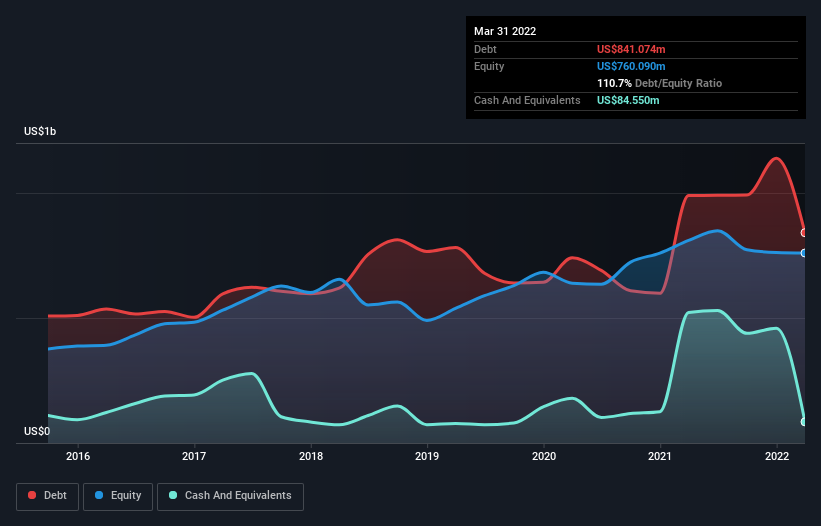
Howard Marks put it nicely when he said that, rather than worrying about share price volatility, 'The possibility of permanent loss is the risk I worry about... and every practical investor I know worries about.' So it seems the smart money knows that debt - which is usually involved in bankruptcies - is a very important factor, when you assess how risky a company is. We can see that NewMarket Corporation (NYSE:NEU) does use debt in its business. But the real question is whether this debt is making the company risky.
When Is Debt Dangerous?
Generally speaking, debt only becomes a real problem when a company can't easily pay it off, either by raising capital or with its own cash flow. If things get really bad, the lenders can take control of the business. However, a more usual (but still expensive) situation is where a company must dilute shareholders at a cheap share price simply to get debt under control. Of course, the upside of debt is that it often represents cheap capital, especially when it replaces dilution in a company with the ability to reinvest at high rates of return. The first thing to do when considering how much debt a business uses is to look at its cash and debt together.
Check out our latest analysis for NewMarket
What Is NewMarket's Debt?
You can click the graphic below for the historical numbers, but it shows that NewMarket had US$841.1m of debt in March 2022, down from US$990.2m, one year before. On the flip side, it has US$84.6m in cash leading to net debt of about US$756.5m.

How Strong Is NewMarket's Balance Sheet?
According to the last reported balance sheet, NewMarket had liabilities of US$411.7m due within 12 months, and liabilities of US$1.11b due beyond 12 months. Offsetting this, it had US$84.6m in cash and US$464.5m in receivables that were due within 12 months. So its liabilities total US$972.4m more than the combination of its cash and short-term receivables.
NewMarket has a market capitalization of US$3.14b, so it could very likely raise cash to ameliorate its balance sheet, if the need arose. But it's clear that we should definitely closely examine whether it can manage its debt without dilution.
In order to size up a company's debt relative to its earnings, we calculate its net debt divided by its earnings before interest, tax, depreciation, and amortization (EBITDA) and its earnings before interest and tax (EBIT) divided by its interest expense (its interest cover). This way, we consider both the absolute quantum of the debt, as well as the interest rates paid on it.
NewMarket's net debt of 2.1 times EBITDA suggests graceful use of debt. And the fact that its trailing twelve months of EBIT was 7.8 times its interest expenses harmonizes with that theme. Unfortunately, NewMarket's EBIT flopped 11% over the last four quarters. If earnings continue to decline at that rate then handling the debt will be more difficult than taking three children under 5 to a fancy pants restaurant. The balance sheet is clearly the area to focus on when you are analysing debt. But it is NewMarket's earnings that will influence how the balance sheet holds up in the future. So when considering debt, it's definitely worth looking at the earnings trend. Click here for an interactive snapshot.
Finally, while the tax-man may adore accounting profits, lenders only accept cold hard cash. So the logical step is to look at the proportion of that EBIT that is matched by actual free cash flow. Over the most recent three years, NewMarket recorded free cash flow worth 55% of its EBIT, which is around normal, given free cash flow excludes interest and tax. This cold hard cash means it can reduce its debt when it wants to.
Our View
NewMarket's EBIT growth rate was a real negative on this analysis, although the other factors we considered cast it in a significantly better light. But on the bright side, its ability to to cover its interest expense with its EBIT isn't too shabby at all. Looking at all the angles mentioned above, it does seem to us that NewMarket is a somewhat risky investment as a result of its debt. That's not necessarily a bad thing, since leverage can boost returns on equity, but it is something to be aware of. There's no doubt that we learn most about debt from the balance sheet. But ultimately, every company can contain risks that exist outside of the balance sheet. For example NewMarket has 3 warning signs (and 1 which shouldn't be ignored) we think you should know about.
If, after all that, you're more interested in a fast growing company with a rock-solid balance sheet, then check out our list of net cash growth stocks without delay.
Valuation is complex, but we're here to simplify it.
Discover if NewMarket might be undervalued or overvalued with our detailed analysis, featuring fair value estimates, potential risks, dividends, insider trades, and its financial condition.
Access Free AnalysisHave feedback on this article? Concerned about the content? Get in touch with us directly. Alternatively, email editorial-team (at) simplywallst.com.
This article by Simply Wall St is general in nature. We provide commentary based on historical data and analyst forecasts only using an unbiased methodology and our articles are not intended to be financial advice. It does not constitute a recommendation to buy or sell any stock, and does not take account of your objectives, or your financial situation. We aim to bring you long-term focused analysis driven by fundamental data. Note that our analysis may not factor in the latest price-sensitive company announcements or qualitative material. Simply Wall St has no position in any stocks mentioned.
About NYSE:NEU
NewMarket
Through its subsidiaries, primarily engages in the manufacture and sale of petroleum additives.
Outstanding track record established dividend payer.
Similar Companies
Market Insights
Community Narratives



